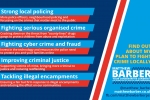Thames Valley Police and partners, including the Office of the Police and Crime Commissioner, are starting a second drugs diversion pilot scheme today (13/1) in Windsor and Maidenhead.
The scheme is going to run alongside the first pilot which is in West Berkshire, and both have involvement from a range of partners including Cranstoun, who provide the drug support service, the Police and Crime Commissioner for the Thames Valley, who has helped fund the scheme, Windsor and Maidenhead Council and the Youth Offending Team.
Both pilots will be reviewed and these results will help to establish if one scheme could be rolled out across the Thames Valley area.
It will differ slightly to the pilot currently running in West Berkshire which is a voluntary attendance scheme. If a referred individual does not attend, they are no longer eligible for a further diversion if found in possession of drugs again.
The new pilot scheme in Windsor and Maidenhead is a deferred prosecution scheme. If an adult individual does not attend, they are reported for the offence which is likely to result in a summons to court. This does not apply for under 18’s, if they fail to attend, they would no longer be eligible for future further diversion if found in possession of drugs again, in the same way as the first pilot scheme.
Both schemes aim to reduce the harm caused by the use of drugs and drug related offences, allowing offenders in possession of small quantities of illegal drugs an opportunity to be offered a tailored diversion route to address their use of drugs instead of facing prosecution.
The aim is to prevent the cycle of re-offending and long term demand upon the police and judicial services by providing specialist support.
However, offenders found to be in possession of larger quantities of drugs, those suspected of supplying illegal substances or those who do not engage with the specialist support, will face arrest and prosecution.
The new pilot will run for the next three months, both schemes will then continue to run whilst an evaluation is taking place and a decision about any further roll out is made.
Detective Superintendent Justin Fletcher, said: “We are delighted to be starting the second phase of the Drugs Diversion Scheme in the Thames Valley.
“The second pilot in Windsor and Maidenhead will run alongside the first in West Berkshire.
“The differences between the two will then be evaluated to establish whether either pilot could be replicated across the Thames Valley.
“There is evidence to suggest links between drug use and criminality. Both pilots offer a tailored programme of support for those who would ordinarily receive a criminal sanction.
“With continued cross partner working, this should have a positive impact on the Thames Valley community as a whole.
“Recently, Thames Valley Police launched the True Costs campaign, and this will be looking at the wider reaching harm of the drugs market with the first phase establishing the real harm and impact on children.
“Thames Valley Police has seen children as young as 12 involved in the drugs trade.
“The pilot in West Berkshire has already shown success when working with children and young people. From a previous preliminary evaluation it found 78% completed the full programme of treatment with The Edge.
“The scheme provided an opportunity for intervention and a chance for those referred to further specialist youth support.
“The process is also more efficient for officers as when a diversion is in place there is no requirement to attend custody and therefore helps to free up valuable time for frontline officers, meaning they can spend more time targeting serious crime which is causing more harm to our local communities.
“The drugs diversion scheme is in place to help people rather than only provide a criminal sanction. This is to deliver an opportunity to change behaviour and receive support rather than a criminal record in the hope to reduce drug use and the drugs market in the area.”
Police and Crime Commissioner for Thames Valley, Anthony Stansfeld, said: “We are pleased to fund such an important project which will help tackle some of the drugs related crimes we have in the Thames Valley. Partnership working in this way is crucial for us to be able to help with such problems.
“We’re encouraged by the findings from the first pilot and look forward to see how this next phase positively impacts the reduction of crime, as well as individuals, in our communities.”
Area Manager for West Berkshire and Resilience for Cranstoun, Geena Virdi, said: “Resilience, part of the Cranstoun group, is delighted to work in partnership with Thames Valley Police to extend the West Berkshire drugs diversion pilot scheme to Windsor and Maidenhead.
“We believe everyone should have the opportunity to live healthy, safe and happy lives.
“By providing a tailored diversion route and specialist support programme through Resilience, we have an opportunity to engage with people who may never seek treatment, look to stop the revolving door of criminal justice engagement and hope to address the high numbers of national drug related deaths.
“In doing so, we can work with these individuals to address their use of drugs, make healthier choices and reduce harm.”
A Cranstoun Recovery Worker, added: “The drugs diversion pilot scheme allows individuals to access harm reduction, preventative support and as required psychosocial or prescribing support.
“The scheme offers an opportunity to divert people away from criminal justice cycles and provides appropriate information and support to people to understand the impact of ongoing substance use so they can make positive changes.”
A peer worker from Cranstoun, said: “The drugs diversion pilot scheme is a really important step forward and gives people an opportunity to be healthy, safe and happy. Without the scheme, individuals may never seek help to address their use of drugs.”
Councillor David Cannon, Lead Member for Public Protection, said:
"This is a really positive step towards reducing drug use in our area. It’s so crucial to have a considerate approach that focuses on help, rather than going straight to a criminal record.
“Everyone involved in this scheme should be proud and we hope it can make a difference to ensuring everyone is able to live a healthy, happy life.”
Both schemes will continue to be evaluated to assess whether it is still reducing drugs-related harm and ensure it is being applied fairly.




